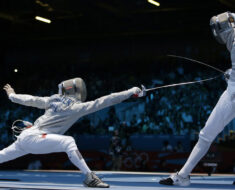“My son wrestled since he was in elementary school. Now he’s in high school and he’s so exhausted he didn’t even make the team.”
“My neighbor plays club basketball year-round and is out indefinitely due to stress fractures in her lower legs…”
“All I’ve played is football, now I’m not a starter so I’ll quit. I think it’s too late to start another sport now…”
Have you ever heard statements like these? I’m sorry to say that I hear them all too often. With the media screaming about the Tiger Woods and Venus and Serena Williams of the world, many people are making the mistake of starting a sport at a young age and specializing in it. The lure of college scholarships has also convinced these people that majoring is the only way to get good at a sport.
Before anyone decides to specialize, they should consider the dangers involved in participating in only one sport. Here are 4 dangers of specialization:
1. Overuse Injuries :
Stressing the body in the same way over and over again for all or much of the year can lead to overuse injuries. Stress fractures, compartment syndrome, and other conditions often result from a lack of diversity in athletes’ activities. It’s best to challenge your body in different ways throughout the year to develop as an athlete. Different sports will put different stressors on your body, leading to better overall athletic performance. Pediatricians across the country have called for children to participate in a variety of physical activities.
2. Burnout:
Playing a sport day after day, week after week, year after year can lead to burnout at a fairly young age. Children begin to play organized sports at younger and younger ages. Someone who starts playing hockey at the age of four may get tired and bored of the sport by the time they reach middle or high school. The non-specialization provides breaks and other experiences to keep a core sport interesting, challenging and fun.
3. The College Scholarship Illusion:
As much as parents want their kids to receive athletic scholarships, the truth is that a very small percentage of athletes actually achieve this goal. A scholarship by itself should not be the driving force behind choosing to participate in just one sport. A person should not bank their health, happiness, and future on the small chance of a “whole trip.” Most athletes will benefit most from a variety of sports experiences, even if a scholarship offer never comes. Also, most college recruiters look for the best overall athletes. One of their first questions is often, “What else did you do besides play (insert main sport here)?” There is evidence to support this. For example, more than 75% of the football recruiting class of 2004 for the Wisconsin Badgers are listed as playing multiple high school sports. Also, look at the draft picks each year in the NFL. Most of those players did not major in a sport during their high school careers. How often have you heard this on draft day: “We’re going to draft the best overall athlete available…” Playing more than one sport is the best way to become that overall athlete.
4. Not reaching your full athletic potential:
While concentrating on one sport will help you develop necessary sport-specific skills, it won’t develop other athletic skills that would transfer to your primary activity. Speed, balance, mental focus, jumping, and turning are emphasized differently in different sports. Everything you do to become a better athlete will also make you a better (insert sport here) player.
More and more research shows that early specialization does not guarantee sporting success. We hear about the few who flourish from early specialization, but what about the vast majority who don’t “make it big” in their chosen sport? How many athletes can you think of who have been successful by not specializing? How about Deion Sanders, Bo Jackson, Jim Thorpe, Babe Didrickson, John Elway, and Marion Jones, to name just a few?
Sport should be encouraged from an early age. But it’s better to encourage participation in a variety of sports activities to develop sports skills that transfer to all sports. This will lessen the dangers mentioned in this article, lead young athletes to reach their full athletic potential, and who knows, maybe bring that coveted college scholarship.
Copyright, Tim Kauppinen, 2005
This article is copyright 2005 Tim Kauppinen. All rights reserved.





